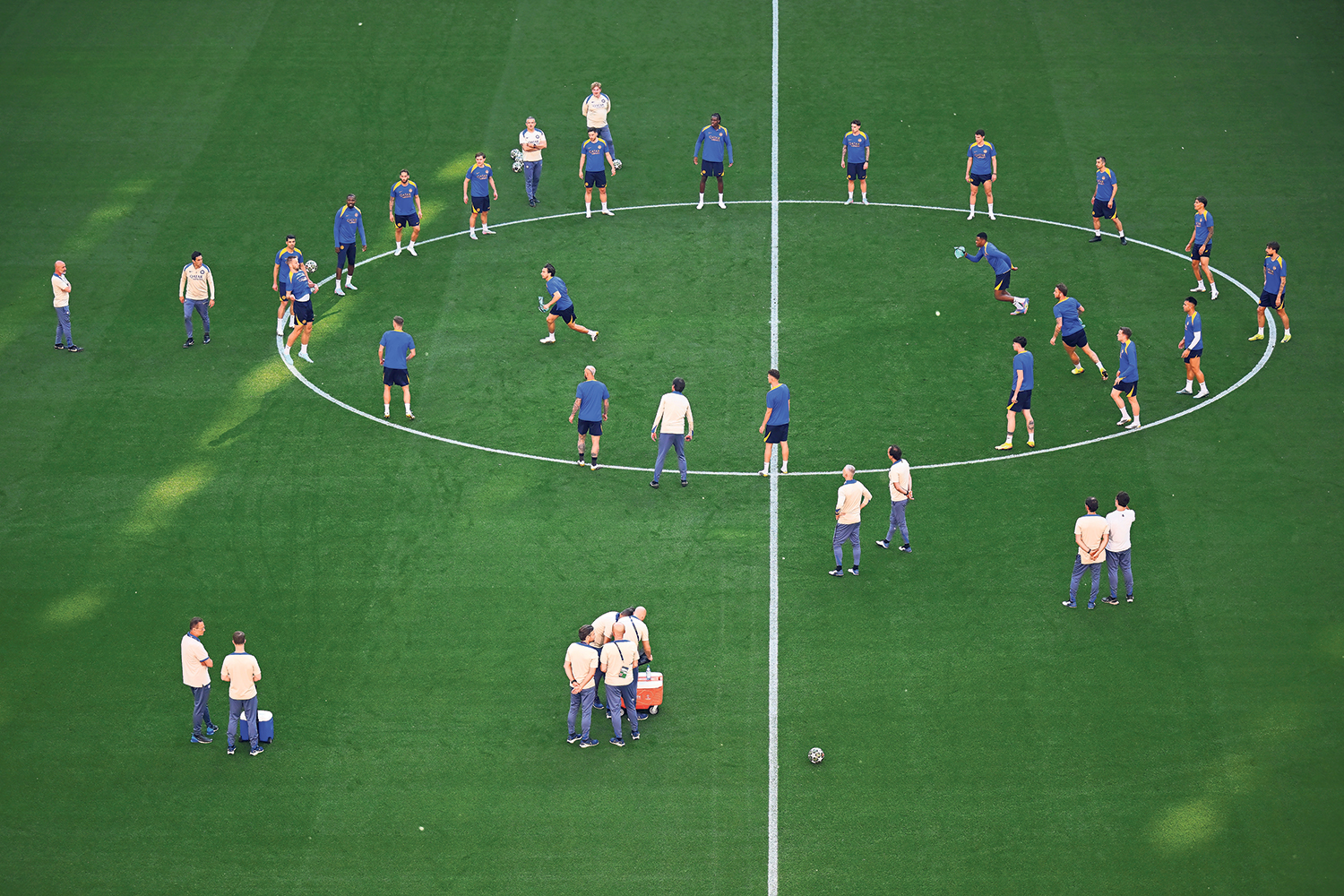Here, then, is football in its final form: David Beckham, Tom Cruise and the NFL star Odell Beckham Jr, gathered around a faux fireside on a Chesterfield sofa on a sound stage in London, maintaining stilted conversation while the Champions League final plays out on a screen behind them, the biggest game of the season cast into shadow by the halogen light of their fame.
Perhaps, in time, we will come to recognise “Beckham and Friends”, a watchalong show aired by the US broadcaster Paramount+, as a kind of watershed, the logical conclusion to 30 years of rampant commercialisation, the inevitable confluence of YouTube culture and the hot take entertainment complex, the precise moment the sport was consumed by the content industry that has come to surround it.
Alt-casts, as they are known, are a growing staple of sports coverage in the United States; ESPN has been airing Monday Night Football with Peyton and Eli, known by everyone as The Manningcast, for four years. The idea, a network television attempt to capture the vicarious, second-screening experience offered by YouTube and Twitch, is wonderfully simple to explain: the viewer watches two Super Bowl winning quarterbacks watching an NFL game. The exact nature of its appeal is a little more opaque.
That is even more pronounced in the case of Beckham and Friends, which first appeared on American screens for the Champions League semi-finals. Beckham, of course, has as much right as any of his peers to commentate on football, if not more, given his status as a global cultural icon. He offers more eloquent, insightful analysis than Rio Ferdinand repeatedly and performatively shouting “Ballon d’Or”.
Cruise’s credentials are more questionable. He has, certainly, attended a handful of LA Galaxy games over the years. There are suggestions he played “soccer” in high school. He was present to watch the US Women’s team win Olympic gold in Paris last year. He once toured Atlético Madrid’s stadium, and said he would like to go back for a game. There is no documented evidence that he did.
His expertise is irrelevant, of course. Nobody will have tuned in to find out what Cruise thinks of Inter Milan’s intricate tactical fluidity or how Luis Enrique has forged a collective from Paris St-Germain’s gaggle of individuals. The pitch, and the pull, runs no deeper than the curiosity of seeing one of the last true Hollywood greats watching football. The game itself is secondary.
And that suits European football’s executive class – starting with Uefa but taking in most of the game’s immaculately presented powerbrokers – just fine. It is curious, really, quite how obsessed the men (and they are always men) in charge of the most popular sport in the world have become with the Super Bowl over the last two decades.
As early as 2007, Uefa sent a delegation, led by its marketing and media rights director, Philippe Le Floc’h, to watch the Super Bowl in Miami, hoping for a bit of “inspiration”. In recent years, the fixation has become more pronounced: Karl-Heinz Rummenigge, then Bayern Munich’s chief executive, confirmed in 2021 that Uefa was considering turning the final week of the Champions League into a “major footballing attraction, a bit like the Super Bowl”.
A year later, Nasser al-Khelaifi, whose rés umé includes but is not limited to being president of PSG, told The Athletic that he could not “understand how the Super Bowl can feel bigger than the Champions League final”. Aleksander Čeferin, the president of Uefa and a close ally of al-Khelaifi, has a habit of comparing viewing figures with “Super Bowl audiences”.
Some of the effects of this, now, are visible. The one that tends to attract the most ire, of course, is the pre-game entertainment, an American affectation that many traditional fans view as intolerable. The track record of performers taking the slot is not great: Lenny Kravitz was booed at Wembley last year; Camila Cabello was so offended at being drowned out by Liverpool fans in 2022 that she complained on social media, before swiftly deleting the post. None of that stopped Linkin Park accepting this year’s gig.
Newsletters
Choose the newsletters you want to receive
View more
For information about how The Observer protects your data, read our Privacy Policy
But that is just the start. The Champions League final is no longer a single-day event; like the Super Bowl, it essentially colonises its host for an entire week, a rolling carnival of corporate junkets and sponsorship activations. In Munich, the Odeonsplatz was given over to an Inter fan zone; giant footballs were placed in front of the Rathaus; the Bayerischer Hof, long a favoured haunt of Munich’s aristocrats and also Lothar Matthäus, was requisitioned by Uefa.
It has grown into an event of such scale that only a handful of cities can realistically host it. Uefa learned that lesson to its cost in Cardiff in 2017, when the Welsh capital’s hotel capacity was reached by the influx of fans. Munich's transport system was overwhelmed three hours before kick-off here. There are now half a dozen cities, at most, that can handle it, a field shrunk by the fact that Paris proved in 2022 that it cannot guarantee the safety of those attending. (Next year’s will be held in Budapest, a decision that has the air of realpolitik; Baku has applied for 2027 after Uefa rescinded it from Milan.)
And then there are the impacts that are a little less apparent. The point of the Super Bowl, of course, is that it is not just a sporting event. Much of the audience tunes in for the pageantry, the entertainment, the half-time show; to a considerable proportion of the 93 million Americans (largely) who watch, the identity of the teams is not especially relevant. It is a game that plays out in the background; as with Beckham and Friends, the sport itself is the second screen.
The changes to the competition were done not in the name of sport but of content
The changes to the competition were done not in the name of sport but of content
That is the direction of travel for the Champions League, too. The world of the tournament is shrinking in more ways than one. This was the first final for more than 20 years that did not include a Spanish, English or German team. Inter Milan arrived in Munich as considerable underdogs, their squad constructed on a shoestring compared with the functionally bottomless wealth of PSG. And that is Inter Milan, one of the biggest clubs on the planet.
It is, increasingly, a competition engineered deliberately to favour a select few. The changes to the format that were introduced this season – a surrender dressed up as a compromise – were done so not in the name of sport but of content, designed to produce not just more games but more blue-chip games, the meetings between Europe’s giants that traditionally happen only in the knockout rounds.
The assumption that this was simply meeting the demands of the audience appears to be sincerely held – that there is an underlying appetite for those games – but it misses one crucial element. What matters in the latter stages of the tournament is not the allure of the teams, but what is at stake. PSG, for example, played Bayern Munich in this year’s group phase. The game was so forgettable that there is a chance neither of them remembers. That jeopardy cannot be replicated; it can only ever be ersatz.
That is especially true of a final. There will be some within European football’s hierarchy who regard PSG facing Inter in the sport’s biggest annual game as something of an anticlimax: Real Madrid, or the global stars of the Premier League, or Lamine Yamal and his band of Barcelona prodigies, would have been a much easier sell.
But that is sport: its conclusion cannot be engineered, not with any degree of certainty. There are some games that matter because of what they are, not because of who is in them; some games that do not require artificial embellishment; some games that deserve to be front and centre, that outshine even Tom Cruise. It is a shame that those in charge of the sport do not see that.
Photograph by Sebastian Widmann/ UEFA via Getty Images

